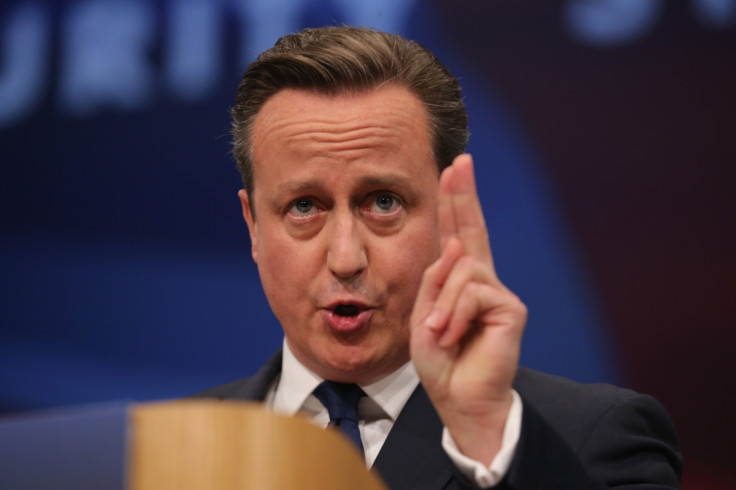Cameron's attack on 'terrorist-sympathising' Corbyn resembles a McCarthyist witch-hunt

The steel barricades that surrounded this year's Tory party conference in Manchester are gone. They were torn down not long after all the political VIPs departed this city to turn the speeches of the home secretary, the chancellor and the prime minister into policies that will effect not only this country, but the EU and the Middle East.
By all accounts and no matter how much Tory policy wonks gild the lilly, Britain will be subjected to more austerity according to the speeches uttered by this government's ministers. Between euphemism and rancour, the words this week of George Osborne and Theresa May has promised Britain: unsustainable devolution to economically disadvantaged cities and a draconian response to a refugee crisis not seen since the end of the Second World War.
Cameron wrapped himself up like an evangelical minister in a mourning shroud for the victims of 911.
No matter what the government department, there is no end in sight for this government's determined efforts to reduce the social safety network. Which is why Jeremy Hunt and Ian Duncan Smith and other ministers dismissed the contribution under 25 year olds make to Britain, castigated the vulnerable, the poor and ordinary workers with more cuts to benefits.
Both the democratic rights of trade unions, along with the rights of senior citizens to dignity in old age free of want were held in contempt by ministers at fringe events that were more a celebration of unmitigated capitalism rather than good governance.
Still, no matter the right-wing excess displayed at the Tory party convention from ministers and delegates − which made it appear more like a tribal feast celebrating the return of hunters who had great success in stalking and killing deadly prey that had threatened their village, than a political event − this conference would not have been unique, save for David Cameron's leader's speech.
It was in that address that the prime minister mixed in with mellifluous words of a Greater Britain with broken shards of glass for Jeremy Corbyn. David Cameron did more than attack a political opponent in his speech, he crossed the line from partisan politics to the nefarious McCarthyism of the 1950s.
When David Cameron said about the leader of the opposition: "We cannot let that man inflict his security-threatening, terrorist-sympathising, Britain-hating ideology on the country we love," he changed the tone and shape of modern British politics and returned it to a darker period in this nation's history.
Cameron wrapped himself up like an evangelical minister in a mourning shroud for the victims of 911 and implied that because Jeremy Corbyn and other legal scholars had concerns over the extra judicial killing of Osama bin Laden, they did not appreciate the horror and devastation that occurred at the Twin Towers on 11 September 2001.
Over the next five years Britain will see a Conservative party push its ideological agenda of austerity and privatisation with the cruelty of zealots to the detriment of our democratic institutions and many of this country's citizens.
Cameron's attack on Jeremy Corbyn resurrects the politics of the Cold War, when people of good will, politicians, activists, gays, artists and ordinary citizens were deemed enemies of the state because they opposed colonialism, racism and nuclear weapons or embraced their sexual orientation in a time of homophobia.
In those days, whether here or in the United States, when political demagogues attacked their opposition by smearing them as unpatriotic or sympathetic to communism or socialism it was done not through jurisprudence but as a witch-hunt whose only purpose was to diminish the democratic rights of a free people.
So, when a 21<sup>st century British prime minister spends a portion of his leader's conference speech characterising his political opponent as a man who doesn't love his country and is a threat to the security of this nation, we must grow concerned for this new Tory politics. It is as if David Cameron and the Conservative party want to draw an iron curtain around fair play and common sense in a cynical attempt to maintain power through fear.
The question that now must be asked is if the Tories believe Jeremy Corbyn is unpatriotic, does that mean that those who support his policies on the environment, on the EU and on the Middle East are also unpatriotic and a threat to this country's security?
In his speech the prime minister spoke of what is not written but he should also remember what is written and that is our nation's history both noble and ignoble. Britain's legacy is glorious and also fraught with great misdeeds but it does teach us that great politicians, political movements and societies aren't built upon propaganda, rancour and discord.
Great politicians, like great societies, stem from discipline, prudence, empathy and vision that invites all of its citizens to enjoy the benefits and responsibilities of democracy. But the politics envisioned by Cameron suggests that over the next five years Britain will see a Conservative party push its ideological agenda of austerity and privatisation with the cruelty of zealots to the detriment of our democratic institutions and many of this country's citizens.
Harry Leslie Smith is a 92-year-old Second World War veteran, activist and writer. His first book, Harry's Last Stand, was published in June 2014 and his second, Love Among the Ruins, is out now. Check out www.harryslaststand.com and follow him on Twitter at @Harryslaststand
© Copyright IBTimes 2025. All rights reserved.






















